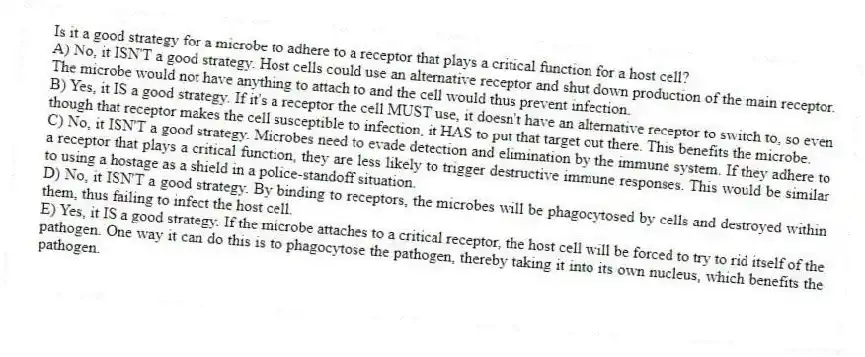
Is it a good strategy for a microbe to adhere to a receptor that plays a critical function for a host cell?
A) No, it ISN'T a good strategy. Host cells could use an alternative receptor and shut down production of the main receptor. The microbe would not have anything to attach to and the cell would thus prevent infection.
B) Yes, it IS a good strategy. If it's a receptor the cell MUST use, it doesn't have an alternative receptor to switch to, so even though that receptor makes the cell susceptible to infection, it HAS to put that target out there. This benefits the microbe.
C) No, it ISN'T a good strategy. Microbes need to evade detection and elimination by the immune system. If they adhere to a receptor that plays a critical function, they are less likely to trigger destructive immune responses. This would be similar to using a hostage as a shield in a police-standoff situation.
D) No, it ISN'T a good strategy. By binding to receptors, the microbes will be phagocytosed by cells and destroyed within them, thus failing to infect the host cell.
E) Yes, it IS a good strategy. If the microbe attaches to a critical receptor, the host cell will be forced to try to rid itself of the pathogen. One way it can do this is to phagocytose the pathogen, thereby taking it into its own nucleus, which benefits the pathogen.
Correct Answer:
Verified
Q65: Please select the correct definition of balanced
Q66: A number of viruses often include a
Q67: Jay tells you that he ate chicken
Q68: Select the correct sequence for proving Koch's
Q69: You think that Jay may have a
Q71: Please select the False statement regarding viral
Q72: Which of the following is NOT a
Q73: Home-canned foods should be boiled before consumption
Q74: What is the difference between a primary
Q75: The period of time between exposure to
Unlock this Answer For Free Now!
View this answer and more for free by performing one of the following actions

Scan the QR code to install the App and get 2 free unlocks

Unlock quizzes for free by uploading documents